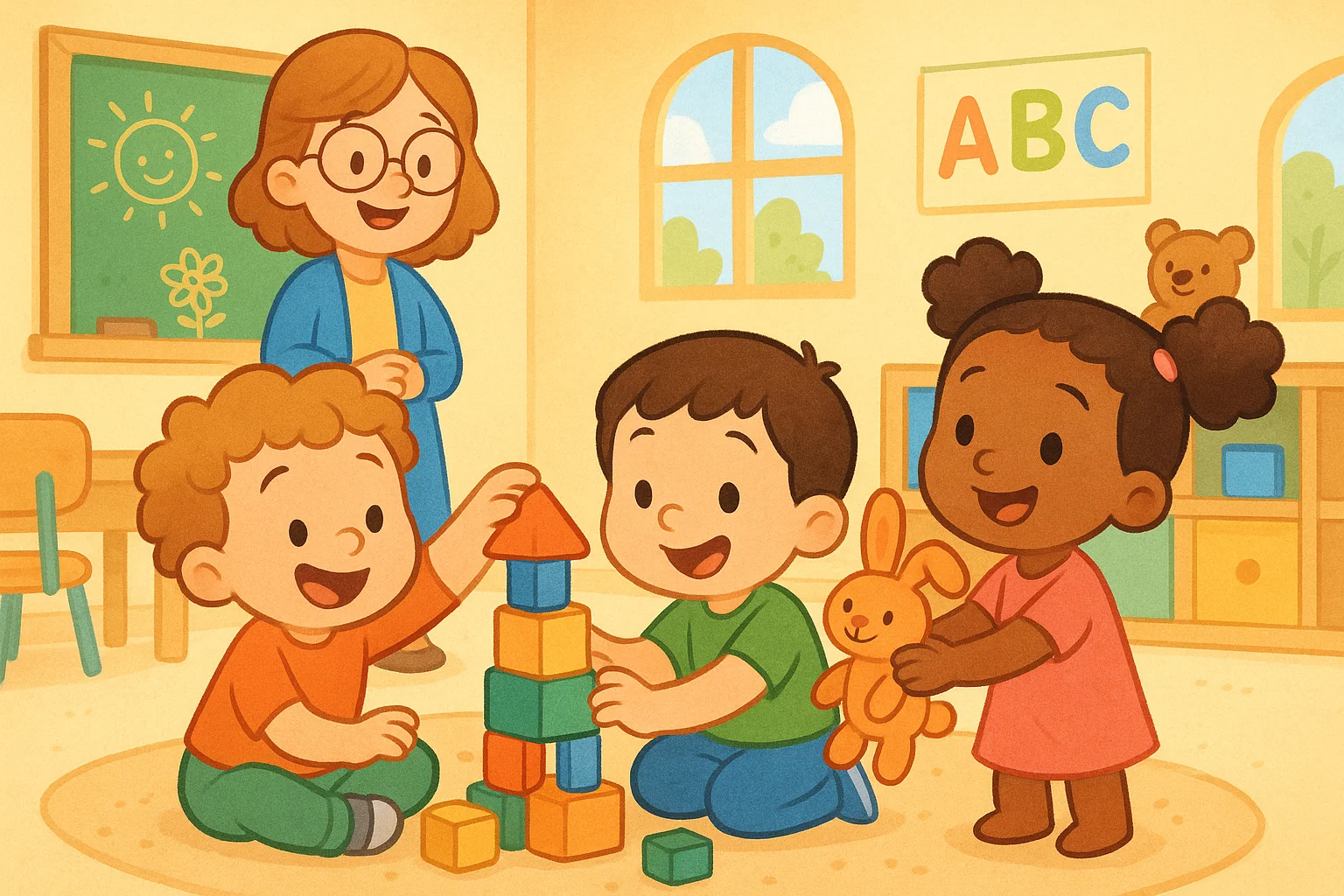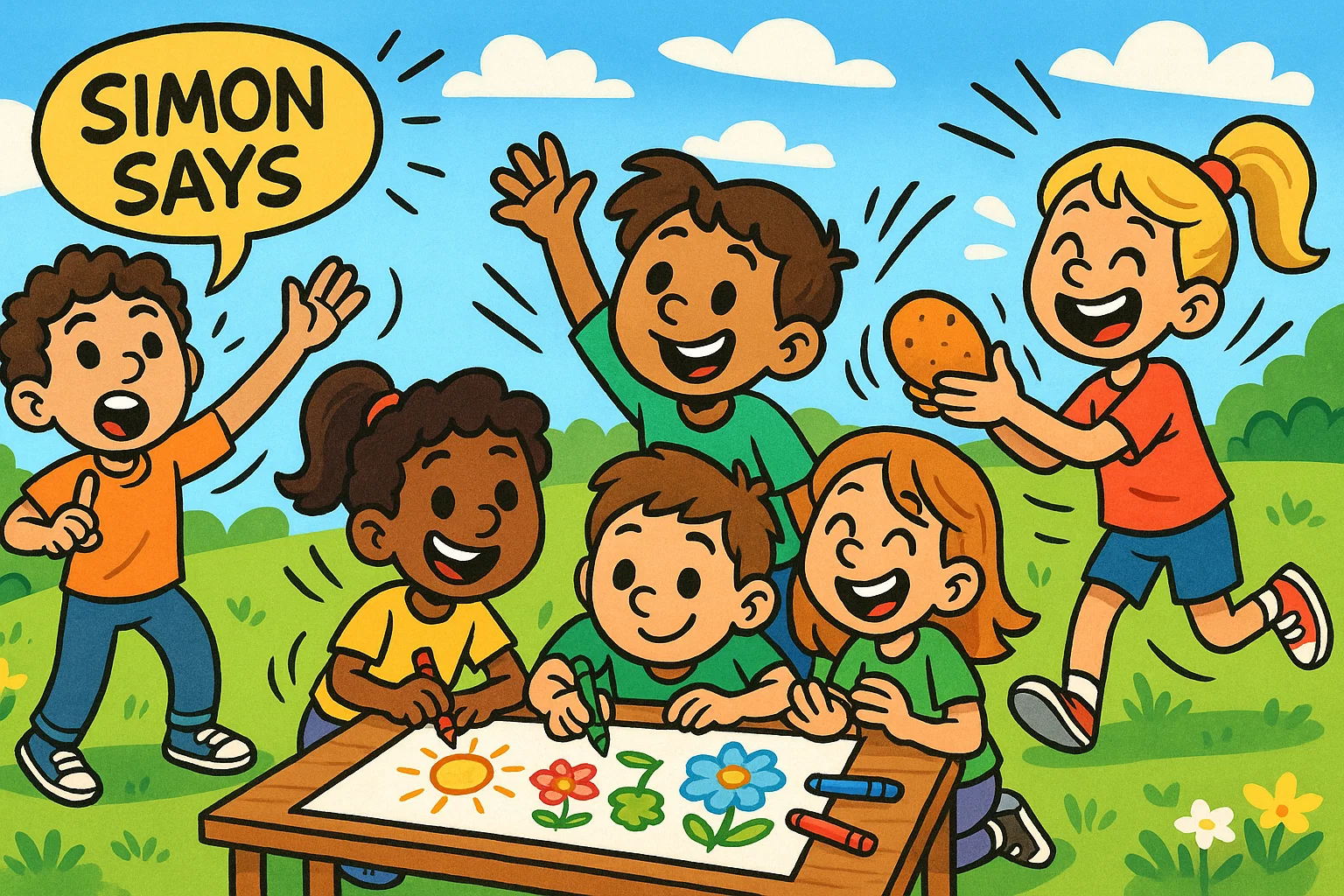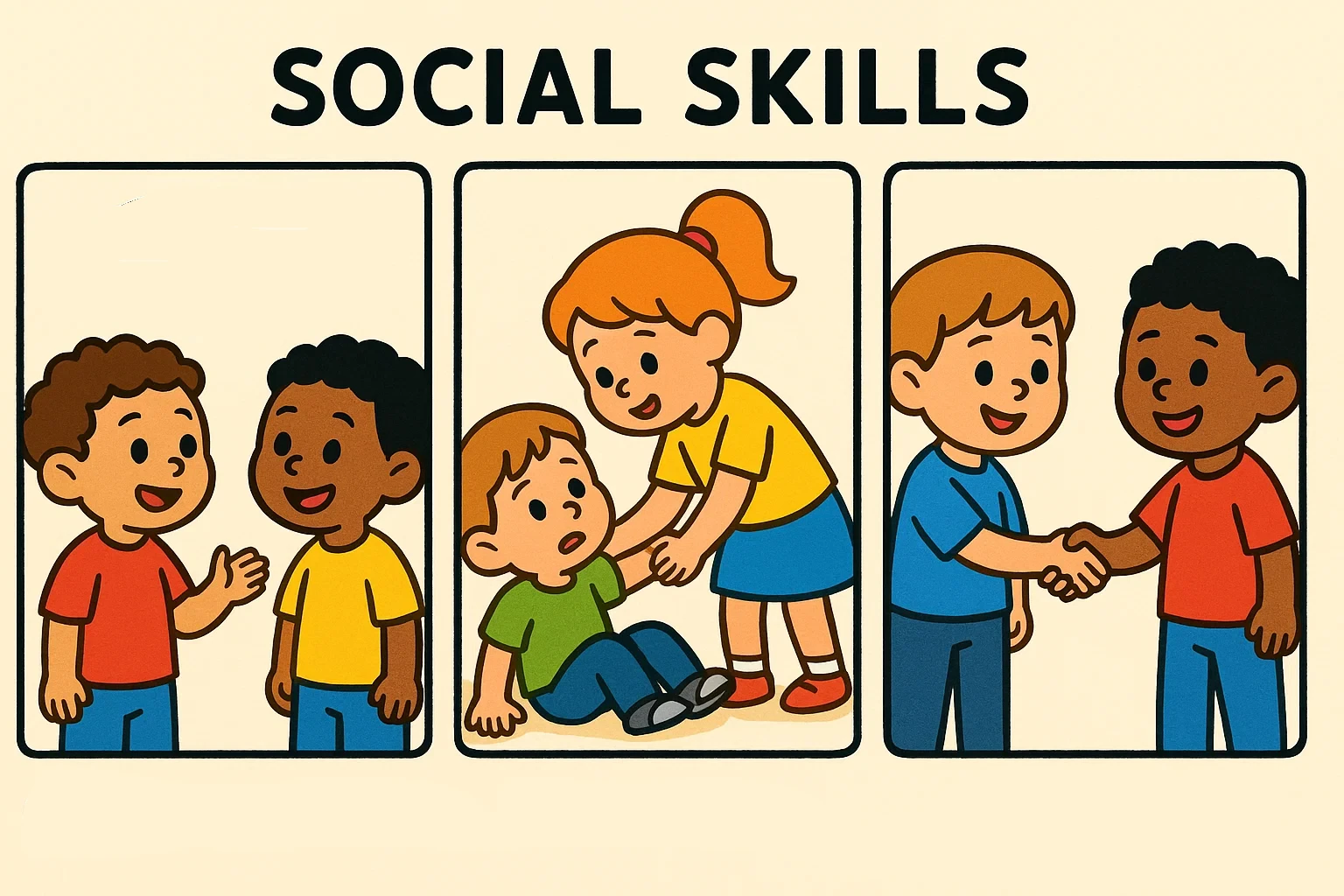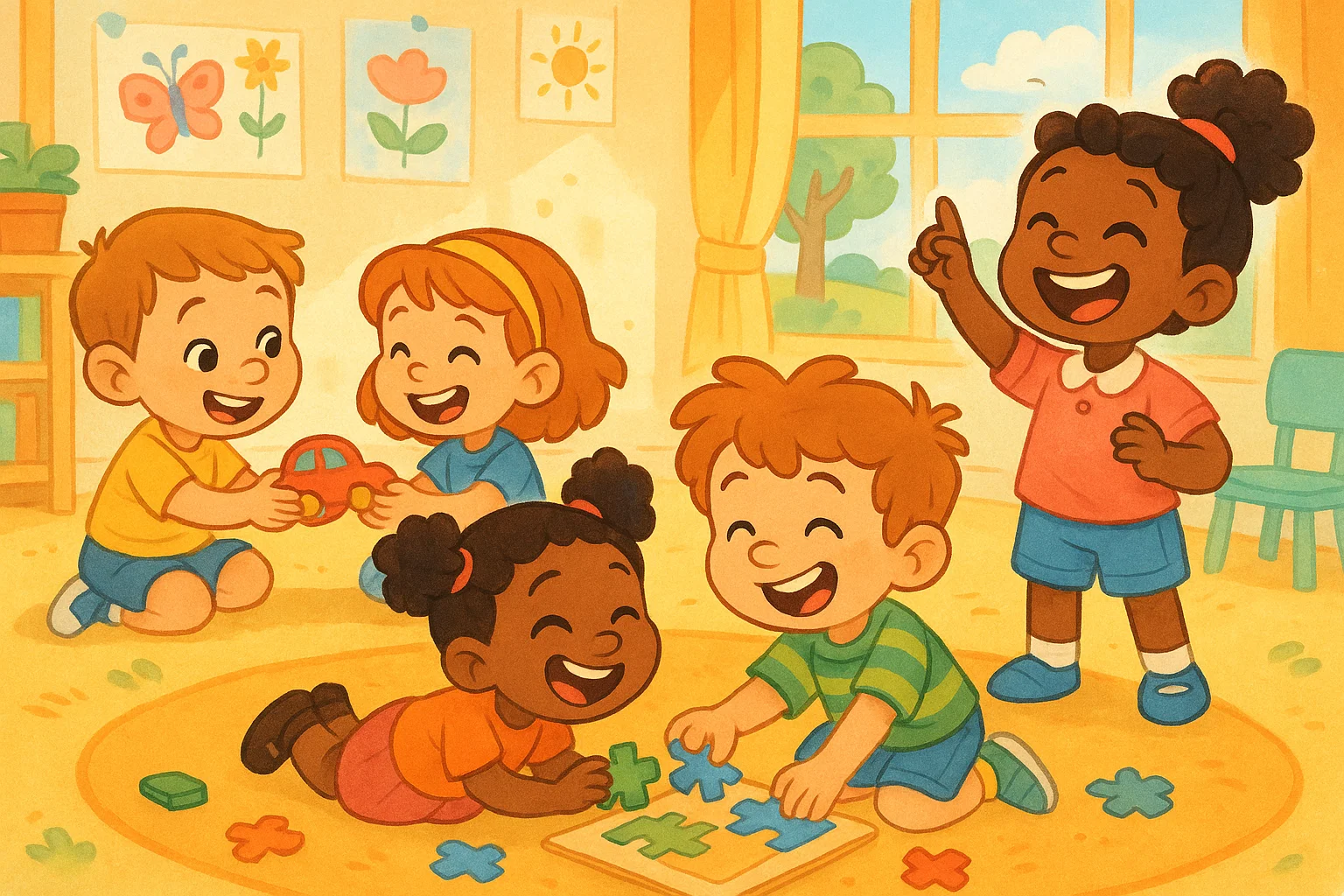The preschool years represent a critical window for developing social skills that will serve kids throughout their lives. During this formative period, kids begin to navigate complex social interactions, learn to communicate with others, and develop the emotional intelligence necessary for building positive relationships.
As parents and educators, we play a vital role in creating opportunities for children to practice these essential life skills. Through carefully selected social skills activities, we can help preschoolers develop the communication skills, empathy, and cooperation abilities they need to thrive in group settings and beyond.
Why Social Skills are Necessary for Preschoolers 🌱

Preschoolers need social skills because these foundational abilities shape how they interact with the world around them. According to child development experts, children who develop strong social competencies during the preschool years are better equipped to handle social situations throughout their educational journey and into adulthood.
Social skills help kids learn to:
- Navigate friendships and peer relationships
- Communicate their needs and emotions effectively
- Resolve conflicts peacefully
- Work collaboratively with others
- Build confidence in social interactions
The preschool environment provides the perfect laboratory for children to practice these skills in a supportive, structured setting. When kids learn important social skills early, they develop a solid foundation for future learning and relationship building.
The role of social development at an early age
Early social development serves as the cornerstone for a child’s overall growth and well-being. During the preschool years, children’s brains are rapidly developing neural pathways that support social and emotional learning. This neuroplasticity means that experiences during this period have lasting impacts on how kids approach relationships and social challenges.
Social development at an early age encompasses several key areas:
| Developmental Area | Key Skills | Long-term Benefits |
| Emotional Recognition | Identifying feelings in self and others | Better empathy and emotional intelligence |
| Communication | Listening, speaking, non-verbal cues | Stronger academic and social outcomes |
| Cooperation | Taking turns, sharing, following rules | Enhanced teamwork abilities |
| Problem-solving | Conflict resolution, negotiation | Improved critical thinking skills |
Research from the University of Illinois at Urbana suggests that “children who enter school with well-developed social and emotional skills are more likely to succeed academically and have positive relationships with peers and teachers.”
25 Fun Social Skills Activities for Preschoolers 🎈

Now that we understand why developing social skills is so important, let’s get to the fun part. Below you’ll find a selection of 25 engaging and enjoyable activities that help children learn and grow without even realizing it.
Play Pretend Games
Pretend play offers kids rich opportunities to explore different social roles and practice communication skills in a safe, imaginative environment. When children engage in dramatic play, they learn to negotiate roles, share ideas, and work together to create storylines.
Set up themed play areas like a restaurant, doctor’s office, or grocery store. Encourage children to take turns playing different roles, which helps them develop empathy by seeing situations from various perspectives. This activity naturally teaches kids about cooperation while building their creativity and language skills.
Do Crafts Together
Collaborative art projects teach preschoolers important social skills like sharing materials, waiting for their turn, and appreciating others’ creative contributions. These activities also support fine motor skills development while fostering positive group dynamics.
Provide shared art supplies and encourage children to work together on murals, collages, or seasonal decorations. Guide them in discussing their ideas and making group decisions about colors, themes, and designs.
Building Blocks
Block play naturally encourages collaboration as kdis work together to create structures. This activity helps kids develop problem-solving skills while learning to communicate their ideas and listen to others’ suggestions.
Introduce challenges like building a tower that’s taller than everyone in the group or creating a city with different neighborhoods. These goals require children to cooperate, share resources, and negotiate design decisions.
The Cookie Jar Game
This classic circle game teaches children about taking turns and following rules while building anticipation and excitement. Kids sit in a circle and chant, “Who stole the cookie from the cookie jar?” while pointing to different classmates.
The game helps kids practice active listening and gives each child a moment to be the center of positive attention. It also teaches kids about rhythm and group participation.
Tossing Ball Game
Simple ball games can be adapted to teach various social skills. Create games where children must call out a classmate’s name before tossing the ball, or incorporate questions that encourage sharing and communication.
These activities help children develop gross motor skills while practicing turn-taking and learning to include all group members in play activities.
Balloon Drop Game
In this cooperative game, kids work together to keep multiple balloons in the air. The goal isn’t competition but collaboration, as everyone works toward the shared objective of preventing the balloons from touching the ground.
This activity teaches kids that success can come through teamwork rather than individual achievement. It also provides excellent opportunities for kids to encourage one another and celebrate group accomplishments.
Simon Says Game
This beloved game helps kids develop listening skills and impulse control while having fun. Children must pay careful attention to instructions and distinguish between commands that begin with “Simon Says” and those that don’t.
Rotate leadership roles so each child has opportunities to give directions, which builds confidence and helps kids practice clear communication. This game also teaches kids about following rules and the importance of careful listening.
The Hot Potato Game
Hot Potato encourages kids to be gentle with one another while building excitement and group participation. Children pass an object around the circle while music plays, and whoever holds it when the music stops performs a simple action.
This game teaches children about fairness, as everyone has equal chances to participate. It also helps children learn to handle both “winning” and “losing” gracefully.
Pop-Up Balloon Game
Children work in pairs or small groups to keep a balloon in the air using only specific body parts (like elbows or knees). This creates natural opportunities for kids to communicate and coordinate their movements.
The game builds cooperation skills as kids must work together to achieve their goal. It also provides lots of laughter and physical activity, which helps create positive associations with group activities.
Balance Beam Game
Using a low balance beam or tape line on the floor, children practice taking turns while encouraging their classmates. Each child walks across while others cheer them on, building confidence and creating a supportive group environment.
Add variations like carrying objects or walking backwards to increase the challenge and provide more opportunities for peer support and encouragement.
Follow the Leader Game
This simple game teaches children to observe carefully and take turns being leaders. The child who leads gets to practice decision-making and clear communication, while followers learn to pay attention and cooperate.
Encourage leaders to choose movements that everyone can do safely, which helps build consideration for others’ abilities and needs.
Beanbag Toss Game
Set up targets at varying distances and have kids take turns tossing beanbags. Encourage kids to cheer for their classmates and celebrate everyone’s efforts, not just successful tosses.
This game teaches children about encouragement and sportsmanship while providing opportunities to practice patience and turn-taking.
Telephone Game
The classic Telephone game helps kids understand the importance of careful listening and clear communication. Children sit in a circle and whisper a simple message from one person to the next.
When the message changes as it travels around the circle, children learn about how communication can break down and why it’s important to listen carefully and speak clearly.
Tower of Cups
Children work together to build towers using plastic cups, learning to coordinate their movements and communicate about placement. This activity requires patience and cooperation as kids must work together to prevent the tower from falling.
Introduce challenges like building the tallest possible tower or creating specific patterns, which require kids to share ideas and make group decisions.
Emotion Charades
This game helps kids learn to recognize and express emotions while building empathy and emotional vocabulary. Children take turns acting out different feelings while others guess the emotion being portrayed.
After each round, discuss the emotion and situations that might cause someone to feel that way. This helps kids develop emotional intelligence and understanding of others’ experiences.
Group Storytelling
Children sit in a circle and create a story together, with each person adding one sentence before passing the story to the next person. This activity encourages creativity while teaching children to listen carefully and build on others’ ideas.
Group storytelling helps kids learn that collaboration can create something more interesting than individual efforts alone. It also provides natural opportunities for children to practice public speaking in a supportive environment.
Jigsaw Puzzles
Working on puzzles together teaches kids to collaborate, share pieces, and celebrate group achievements. Choose puzzles appropriate for the group’s skill level and encourage kids to help one another find pieces.
Puzzle activities naturally create opportunities for children to practice patience, persistence, and positive communication. They also support cognitive development while building social connections.
Sing-Alongs
Group singing activities help children feel connected to their peers while building language skills and cultural awareness. Choose songs with movements or call-and-response elements to increase engagement and participation.
Singing together creates positive shared experiences and helps children who may be shy or hesitant to participate in other group activities find their voice in a supportive environment.
Scavenger Hunt
Organize scavenger hunts where kids work in pairs or small teams to find items or complete tasks. This activity encourages communication, cooperation, and problem-solving as children must work together to achieve their goals.
Design hunts that require different skills so all children can contribute meaningfully to their team’s success. This helps kids learn to appreciate diverse abilities and work styles.
Feelings Chart
Create visual charts that help kids identify and communicate their emotions. Use photos of real children showing different expressions, and have regular discussions about feelings and appropriate responses.
This ongoing activity helps children develop emotional vocabulary and learn that all feelings are normal and acceptable. It also provides tools for kids to express their needs more effectively.
Classroom Jobs
Assign rotating classroom responsibilities that require children to work together, such as line leaders, table cleaners, or supply managers. These roles teach kids about responsibility while creating opportunities for cooperation and leadership.
Discuss how different jobs contribute to the classroom community, helping children understand that everyone’s contributions are valuable and necessary.
Puppet Show
Encourage kids to work together to create and perform puppet shows. This activity combines creativity with collaboration as children must agree on storylines, character roles, and performance details.
Puppet shows provide opportunities for children who may be shy to express themselves through characters while building confidence in group performance situations.
Rhythm Games
Use simple instruments or body percussion to create group rhythms and musical patterns. Children must listen carefully to one another and coordinate their movements to create harmonious sounds.
These activities help kids learn about timing, cooperation, and the joy of creating something beautiful together. They also provide excellent opportunities for children to practice taking turns and following directions.
Community Gardening
If space allows, create a small garden area where children can plant, water, and care for plants together. Gardening activities naturally require cooperation as kids share tools, take turns watering, and work together to maintain their garden.
Gardening also teaches kids about responsibility, patience, and the rewards of working together toward long-term goals. It provides numerous opportunities for children to help one another and share in the excitement of watching plants grow.
Cooperative Art Projects
Design art activities that require children to work together, such as creating large murals or collaborative sculptures. These projects teach kids to share materials, negotiate design decisions, and appreciate different artistic perspectives.
Cooperative art activities help children learn that diverse contributions can create something more beautiful and interesting than individual work alone. They also provide natural opportunities for kids to practice patience and flexibility.
Social Skills for Preschoolers to Develop 🎯

To effectively help children, it’s useful to know which specific social skills to focus on first. Let’s explore the key areas where preschoolers can grow and improve.
Cooperation and sharing
Cooperation and sharing form the foundation of successful social interactions throughout life. These skills help children work together effectively and build positive relationships with peers and adults.
Key aspects of cooperation include:
- Learning to take turns in games and activities
- Working together toward common goals
- Compromising when disagreements arise
- Celebrating group achievements
Sharing involves more than just dividing toys or materials. Children must learn to share attention, space, and decision-making opportunities. When kids practice sharing regularly, they develop empathy and learn to consider others’ needs alongside their own.
Teachers and parents can support cooperation and sharing by providing clear expectations, modeling these behaviors consistently, and acknowledging children’s efforts to work together positively.
Communication and emotional recognition
Effective communication skills enable kids to express their thoughts, feelings, and needs clearly while also understanding others’ perspectives. These abilities are essential for building relationships and navigating social situations successfully.
Preschoolers develop communication skills through:
- Learning to use words instead of physical actions to express frustration
- Practicing active listening during group discussions
- Developing non-verbal communication awareness
- Building vocabulary to describe emotions and experiences
Emotional recognition involves understanding both personal emotions and the feelings of others. Children who develop strong emotional intelligence are better equipped to respond appropriately in social situations and maintain positive relationships.
Activities that support communication and emotional recognition include regular circle time discussions, emotion identification games, and role-playing scenarios that help children practice expressing themselves in various situations.
Problem-solving and teamwork
Problem-solving skills help children navigate conflicts and challenges independently while teamwork abilities enable them to work effectively with others toward shared goals. These complementary skills are essential for academic success and positive peer relationships.
Effective problem-solving involves:
- Identifying the problem clearly
- Brainstorming possible solutions
- Evaluating options and their consequences
- Implementing chosen solutions
- Reflecting on outcomes and adjusting approaches as needed
Teamwork skills develop when children learn to:
- Listen to others’ ideas respectfully
- Contribute their own thoughts and suggestions
- Compromise when necessary
- Support teammates’ efforts
- Share in both successes and setbacks
Children develop these skills through structured group activities, guided problem-solving discussions, and opportunities to work together on meaningful projects that require collaboration and creative thinking.


